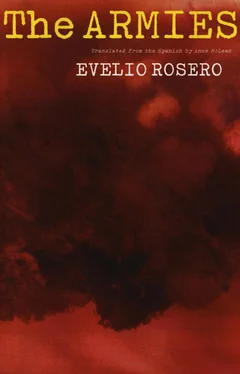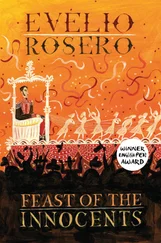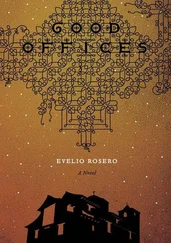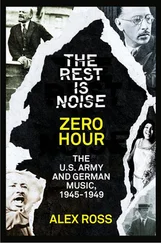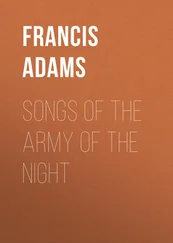“But it is unforgivable to say them. This is a man’s life.”
“I am only saying what I think, which is what everyone thinks, although nobody in the world deserves that fate, that’s cruel.”
“There is no word for it,” she said.
I began to undress, down to my underwear. She looked at me closely.
“What?” I said. “You like ruins?”
And I got under the covers and told her I wanted to sleep.
“That’s what you’re like,” she said, “sleep, watch, and sleep. Don’t you want to hear what Geraldina, your neighbor, did?”
I pretended to be unconcerned. But that shook me.
“What did she do?”
“She took her children and she left.”
Otilia examined me much more closely.
“Before she left she had time to speak, oh yes.”
“What did she say?”
“That it was a disgrace that Gloria Dorado, at this point, two years after receiving a letter, should turn up to hand it over, when it had nothing to do with anything anymore. Marcos Saldarriaga’s situation was very serious, she said, he was not in his right mind, who could be, held prisoner day and night, by people he doesn’t even know, not knowing for how long, perhaps till his death? The things Marcos said were just private affairs, misunderstandings, matrimonial quarrels, desperation, and it was not wise to bring such a letter to a woman as distressed as Hortensia.
“‘What he requested has been carried out,’ Gloria Dorado interrupted her. ‘It has been made public. For two years I didn’t show anyone because the things he wrote seemed harsh, even unjust. But I see that I should have done so sooner, because it’s very possible that what he says is true, that nobody here wants his freedom, not even Father Albornoz.’
“‘You wicked woman!’ shouted Hortensia Galindo. No one knew when she had leapt toward Gloria, her hands out in front of her, as if she wanted to grab her by the hair, but she had the bad luck to trip and fall and bounce, fat as she is, at the feet of the Dorado woman, who shouted: “I’m sure that I am the only one in this town who wants to see Marcos Saldarriaga free, you criminals.”
Ana Cuenco and Rosita Viterbo went to help Hortensia up. No man stepped forward; either they were more frightened than we were or they thought this was a women’s matter.
“‘Get out of my house,’ Hortensia screamed, but the Dorado woman did not go. ‘Didn’t you hear? Get out,’ Rosita Viterbo screamed, and the Dorado woman still did not move.
“Then Ana and Rosita jumped on her; they each grabbed an arm and took her to the patio door; once they were there they pushed her out and closed the door.”
“They did?”
“All by themselves.” Otilia sighed. “Thank God Gloria didn’t turn up with her brother, who would not have allowed it. If a single man got involved, more would follow, and worse things would have happened.”
“Like shots being fired.”
“That’s how stupid men are,” she said staring hard at me and unable to help smiling. But a moment later her face froze. “How sad: Ana and Rosita began serving up the pork; Hortensia Galindo was in a terrible state, sitting in her chair, the plate on her knees, untouched. I saw her tears falling to the plate. Her twins sat beside her eating, unconcerned. No one could console her, and soon they forgot to even try.”
“That’s the pork’s fault,” I said. “Too delicious.”
“Don’t be cruel. Sometimes I wonder if I’m really still living with Ismael Pasos, or with a stranger, a monster. It’s better to think that everyone was suffering like I was, Ismael, and was saddened. Nobody asked for another drink. There was no music, just as Father Albornoz would have liked. They ate and they left.”
“I’m not cruel. I repeat that it hurts me that any man should be held captive against his will, no matter what he has, or what he doesn’t have, because they’re taking those who have nothing too; that said, it’s better to disappear voluntarily, on one’s own, so they don’t force us to disappear, which must be much worse. I’m grateful for my age, half a step from the grave, and I feel sorry for the children, who have a hard road ahead of them, with all this death they’re inheriting, and through no fault of their own. But compared to Marcos Saldarriaga’s fate I’m much more distressed by that of Carmina Lucero, the baker. They took her too, the same day.”
“Carmina,” my wife screamed.
“I found out today.”
“Nobody ever told us.”
“They only talked about Marcos Saldarriaga.”
“Carmina,” my wife said again. And I saw she was starting to cry. Why did I tell her?
“Who told you?” she asked me with a sob.
“Lie down first,” I answered.
But she stayed there, aghast.
“Who was it?” she said.
“Maestro Claudino. He fixed my knee today. I have to take him a hen.”
“A hen,” she said, without understanding. Then she added, strangely, because we have two hens, while she turned out the light and lay down beside me, “And how will you buy it?”
Not waiting for my answer, she began to speak of Carmina Lucero: she had never known such a good woman, and she thought of Carmina’s husband and her children, how they must have suffered.
She said, “When things at home weren’t going well, Carmina gave us as much bread as we needed on credit.”
Every once in a while I would hear her moan fade into the hot air we were breathing, just when I thought that restorative sleep was at last about to come and help us, and indeed we were more than exhausted resting on a bed in a town in a country under torture and I did not yet dare to reveal that Carmina had already died in captivity two years ago; nevertheless: that night neither of us could sleep.
Why stay in bed? Dawn breaks and I leave the house: I retrace my steps back toward the cliff. On the mountain across the way, at this time of the morning, the scattered houses look eternal, far from each other, but united anyway because they are and always will be on the same mountain, high and blue. Years ago, before Otilia, I imagined myself living in one of them for the rest of my life. No one lives in them today, or very few of them anyway; not more than two years ago there were close to ninety families, and what with the war — the drug traffickers and army, guerrillas and paramilitaries — there are only sixteen left. Many died, most of them must have had to leave: who knows how many families are going to stay on now? Will we stay? I look away from the landscape because for the first time I cannot stand it, everything has changed now — but not the way it should have, damn it.
A pig walks toward me along the edge of the cliff, sniffing the ground. It stops for a moment at my feet, lifts its snout, snorts, eyes up my shoes: whose pig is this? All through the town, every once in a while, a pig or a hen will wander, no sign of an owner. It is possible that it is I who has forgotten the names of the owners of the pigs; I used to recognize them. And what if I took this pig to Maestro Claudino, instead of a hen?
I hear a shout in the early morning, and then a shot. It is up ahead, at the corner. The detonation has formed a black cloud of smoke there. A white shadow runs across the street, from that corner to the next. Nothing more is heard, except footsteps hurrying away till they disappear. Today I got up early to go out, better to go out, one cannot go for a quiet stroll these days; I hear my footsteps now, echoing one behind the other, speeding up, in a definite direction; what am I doing here, at five in the morning? I discover that the route back to my house is the same one the running shadow took. I stop, it is not prudent to follow fleeing shadows, there are no more shots to be heard, a private matter? Could be; it does not seem like the war, it is another war: someone caught someone stealing, someone simply caught someone, who? I keep walking, stop, listen: nothing else, no one else. My knee: “You have to rest it for three days,” Maestro Claudino warned me, and here I am back and forth. Will you start hurting me again, knee? No, my painless steps round the corners, I am cured, what an embarrassment that pain was, Otilia, what a premonition, what a mistake, let nobody miss me when I’m gone, but let nobody have to help me to the toilet, Otilia, die after I do.
Читать дальше
